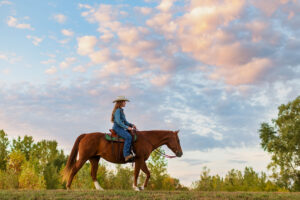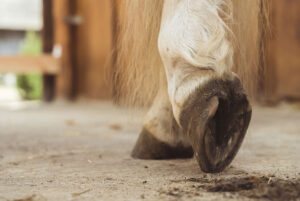Underweight Horses: Surveillance, Management Considerations
- Topics: Article, Body Condition
By Grant Miller, DVM– Reprinted from The Horse Report with permission from the Center for Equine Health, School of Veterinary Medicine, University of California, Davis.
You are driving on a country road and pass a picturesque scene of several horses grazing in an open field. You notice one horse standing away from the group. Without being able to see much detail, it appears to you that this horse does not look like the others. Its ribs are showing and its hip bones are protruding. Like many concerned citizens, you wonder if the horse is okay, and if someone knows that it is underweight. Is anyone doing anything to address this issue? Should you call someone?
General Observations of Underweight Horses
-
Veterinary involvement in cases is instrumental to a successful outcome.
-
Cases in which underweight horses have been completely deprived of food for a long period of time (days to weeks) are far more complicated and critical than cases in which the horse has had access to food.
-
Diarrhea and colitis that occur during refeeding are serious complicating factors that lower the chance for successful rehabilitation.
-
In some cases underweight horses might display abnormal behavior in relation to eating, such as aggression during feeding time or pica (the ingestion of inappropriate feed such as hair, feces, or dirt/sand/gravel). These psychological conditions might not resolve, despite a return to optimum body condition.
-
Determining the cause(s) of the poor body condition and adequately addressing them will greatly influence the speed and efficiency of recovery.
-
Very rarely will a horse not gain weight or reach optimum body condition, provided that the causes of the low body condition can be adequately addressed. An exception would be horses suffering from end-stage organ failure.
- The ability of a horse to regain weight can vary widely. Some horses might only take a few weeks to reach an optimum body condition, while others can take many months.
If you have experienced this, you are not alone. Animal control agencies indicate that scenarios like this are reported on a daily basis throughout the United States. Reports of underweight horses are made to local animal control departments, humane societies, or legal authorities. These agencies will, in most cases, conduct a site visit to investigate complaints
Create a free account with TheHorse.com to view this content.
TheHorse.com is home to thousands of free articles about horse health care. In order to access some of our exclusive free content, you must be signed into TheHorse.com.
Start your free account today!
Already have an account?
and continue reading.
Related Articles
Stay on top of the most recent Horse Health news with


















